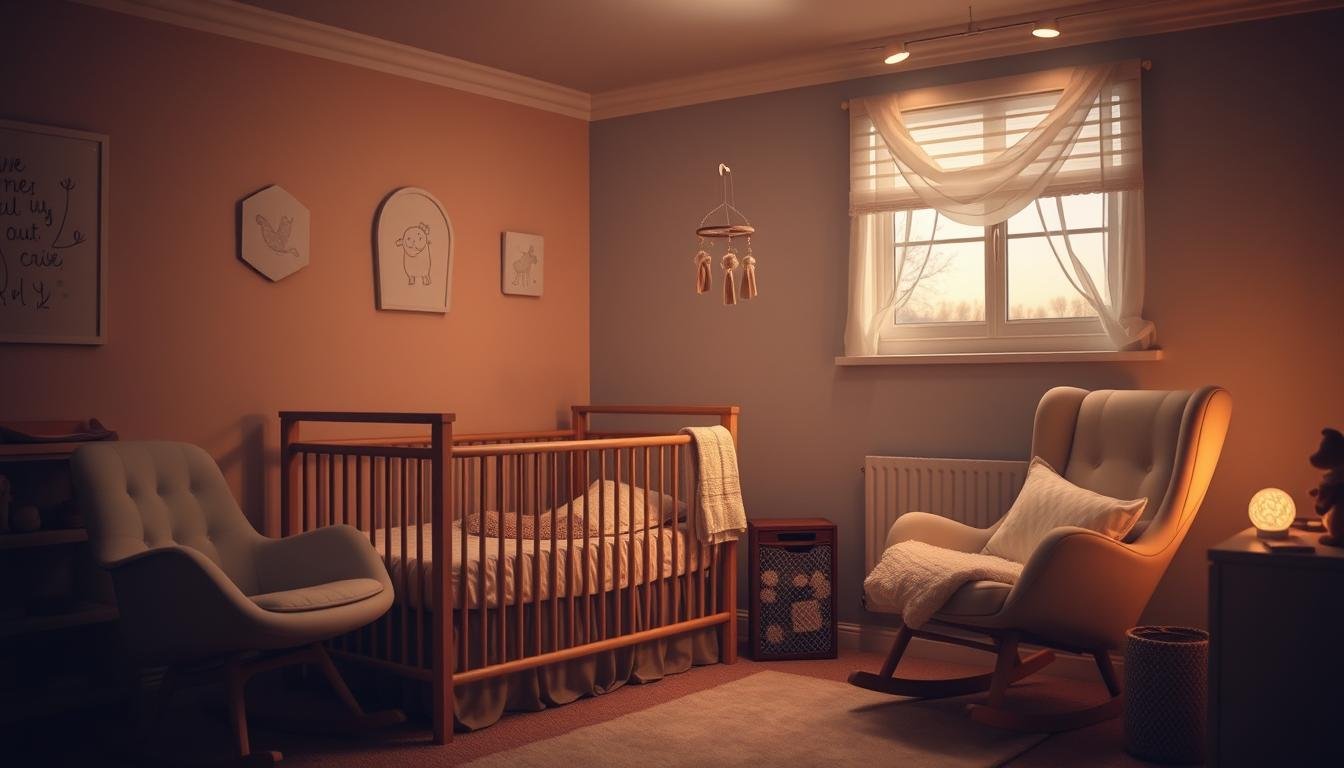Creating a baby bedtime routine tells your baby it’s time to sleep. The best routine fits your family’s life and is done every day. These quiet moments are special and help your baby sleep well for years.
Having a consistent infant sleep schedule and calming techniques for babies before bed is key. It helps your baby sleep well and promotes healthy sleep habits. With some creativity and patience, you can make a peaceful evening ritual for infants that you’ll both love.
Why is a Baby Bedtime Routine Important?
Creating a consistent bedtime routine is key for your baby’s sleep and growth. It helps them understand day and night and feel safe. Studies show that babies who follow a bedtime routine sleep better and feel more secure.
Reinforces Baby's Circadian Rhythms
A bedtime routine teaches your baby the day-night difference. This helps them sleep faster and better.
Creates a Sense of Comfort
The steps in a bedtime routine reassure your baby, helping them feel secure. It’s very helpful when they’re going through changes or having trouble sleeping.
Helps Baby Fall Asleep Faster
Babies with a bedtime routine sleep faster and wake up less at night. They also sleep more consistently.
Promotes Better Sleep Quality
A bedtime routine that includes bonding time improves your baby’s sleep. It helps them feel secure and attached, leading to better sleep.
In short, a bedtime routine is a strong tool for your baby’s sleep and growth. It helps them understand day and night, feel safe, and sleep well. This sets them up for a healthy and happy life.
When to Start a Bedtime Routine for Baby
Creating a bedtime routine is key for your baby’s sleep and growth. But when should you start? Experts say 6 to 8 weeks is the best time for a simple routine.
At this age, your baby is getting into a routine. This is a great time for calming activities before bed. Even a cuddle and a book can signal bedtime.
Studies show babies with routines sleep better and wake up less. So, start a routine, even if it’s simple. Consistency is important for healthy sleep habits.
Every baby is unique, so be ready to adjust the routine. The goal is to create a calm space for a good night’s sleep.
Tips for Starting a Bedtime Routine
- Start the routine at around the same time each evening, aiming for a bedtime between 7:00-8:00 pm.
- Incorporate soothing activities like a warm bath, gentle massage, and reading a bedtime story.
- Use white noise or lullabies to help signal to your baby that it’s time to sleep.
- Be consistent with the order and timing of the routine, but be flexible as your baby grows and their needs change.
Starting a bedtime routine early helps your baby sleep better. It sets them up for healthy sleep habits that last into toddlerhood.
How to Create a Calm Evening Routine
Creating a calm bedtime routine is key for babies to relax and sleep well. The best routine includes soothing activities that help your baby wind down. These activities signal it’s time for sleep.
Warm Bath
A warm bath is a great way to start winding down. Newborns might need a bath 2-3 times a week. But, if they love it, it could be daily. Make sure the water is warm and the lights are low for a peaceful setting.
Gentle Massage
Research shows that short bedtime routines work well. Massaging your baby in the evening can boost melatonin. This helps your baby sleep more predictably and quickly.
Lullabies and Soft Music
Soft music or lullabies help your baby feel ready for sleep. Harvard Medical School says avoiding screens at night is best. They can mess with your baby’s sleep rhythms.
Bedtime Story
Reading a favorite book in a quiet voice can also help. It’s a special part of your baby’s evening. It prepares them for sleep.
Consistency is important in a baby’s bedtime routine. Make sure all caregivers follow it. This helps your baby learn to sleep well.
Tips for Establishing a Baby Bedtime Routine
Creating a consistent bedtime routine is key for your baby’s sleep health. Here are some tips to make a soothing evening ritual. This will help your baby sleep better:
- Time it right: Start your baby’s bedtime routine between 7:00-8:00 PM. This helps their body clock stay in sync.
- Put your child to sleep in the same place: Always put your baby in their crib or bassinet. This helps them link that place with sleep.
- Create the right atmosphere: Dim the lights, use calming white noise, and keep the room cool. This signals it’s time to relax.
- Master the drowsy but awake drop-off: Put your baby down when they’re sleepy but still awake. This teaches them to fall asleep on their own.
- Be willing to adjust: As your baby grows, their sleep needs may change. Be flexible and adjust the routine as needed to keep a consistent bedtime routine.
Consistency is the secret to success. A predictable bedtime routine makes your baby feel safe. It also helps them fall asleep faster and sleep better overall.
How to Create a Calm Evening Routine for Your Baby
Creating a soothing bedtime routine is key for your baby’s sleep. Begin with fun activities or gentle dancing to release energy. Then, move to a warm bath to relax the body and mind.
The last feeding before bed is vital. Make sure to give a full feeding to prevent night hunger. After, change diapers and dress your baby in cozy pajamas.
- Play quiet games, chat softly, and read bedtime stories for calm.
- Sing lullabies or play soothing music to help your baby relax.
- Use a sound machine or calming nightlight to aid sleep.
Adding these relaxing activities to your baby’s evening routine is essential. It helps create a consistent pattern, supporting their sleep. With practice, you’ll have a peaceful bedtime routine that soothes your baby and ensures a good night’s sleep.
Adjusting the Routine as Baby Grows
As your baby grows, their needs change. It’s important to adjust the bedtime routine. For example, as they get older, bathtime might become more fun. So, you might move it earlier, saving the calm activities like stories or massages for bedtime.
Keeping the routine consistent is crucial. But it should also change to fit your child’s growing needs. If your baby starts sleeping through the night, update the routine. If they have trouble sleeping, add calming activities to help them relax.
The aim is to create a how to adapt baby’s bedtime routine that supports healthy sleep. By modifying routine as baby’s needs change, you keep the updating evening routine for different ages effective. This benefits your child’s overall health and well-being.
- Watch your baby’s sleep patterns and adjust the routine as needed.
- Add new activities or change the timing of old ones to meet your child’s growing needs.
- Keep the routine’s structure consistent while being flexible for your baby’s growth.
By paying attention to your baby’s needs and making smart changes to the bedtime routine, you help them grow smoothly. This ensures a successful transition as they develop.
Creating a Shorter Nap Routine
Naps are as crucial as nighttime sleep for your baby’s sleep routine. Combining nap and bedtime routines helps your baby understand sleep cues better. This makes falling asleep easier.
Naps are shorter than nighttime sleep. So, your naptime routine can be shorter too. Use your baby’s favorite story or lullaby in their nap routine. This makes it consistent and signals sleep time clearly.
- Start a 5-10 minute pre-nap routine to signal sleep time.
- Keep the nap area dark, quiet, and cool for better sleep.
- Use consistent sleep phrases and familiar routines for easy naptime transition.
- Keep the same pre-nap routine away from home for comfort.
- Watch your baby’s age-appropriate wake windows to avoid overtiredness.
A consistent, shorter naptime routine strengthens sleep associations. This makes the shift from nap to bedtime smoother and more successful.
Dealing with Bedtime Tears and Separation Anxiety
Babies go through changes that can lead to tears and meltdowns at bedtime. But, with the right steps, you can make bedtime calmer and more peaceful for your little one.
Separation anxiety is common in babies, often seen between 8-10 months and again at 14-18 months. They might become clingy and cry when you leave. This can disrupt their sleep, causing them to wake up and cry for you.
- Check your baby’s wake windows and adjust bedtime routines. Make sure they get enough sleep during the day for better nighttime sleep.
- Play and engage with your baby in their room during the day. This helps them see their room as a positive place, reducing bedtime anxiety.
- Use a comforting object, like a favorite toy or blanket, to make your baby feel safe and relaxed at bedtime.
- Teach your baby to relax, like replacing scary thoughts with calm images. This helps them learn to fall asleep on their own.
- Stay calm and confident at bedtime. Babies sense your anxiety, so being calm helps soothe their fears.
Teaching your baby to fall asleep independently is possible with the right approach. By tackling the reasons behind their bedtime tears and anxiety, you can make bedtime a more enjoyable time for all.
Conclusion
Creating a calm bedtime routine is key for your baby’s sleep health. Activities like warm baths, massages, lullabies, and bedtime stories help signal sleep time. These steps make the evening calm and predictable for your child.
Being flexible and adjusting the routine as your baby grows is important. It helps you both enjoy a peaceful evening. This consistency and patience will pay off in the long run.
Good sleep habits start with a consistent bedtime routine. A relaxing environment and calming activities are crucial. These help your child transition smoothly to sleep.
Consistent routines help infants develop healthy sleep patterns. They provide comfort and improve sleep quality. This sets the stage for a lifetime of good sleep habits.
Follow the strategies in this article to help your baby sleep well. Seek advice from sleep specialists if needed. Every child is different, so be patient and adaptable.
Always prioritize your child’s comfort and well-being. With time and effort, you can create a soothing bedtime routine. It will become a special part of your family’s daily life.





